Importance of Attachment and Psychosocial Development in Infants aged 0-6 Months
VerifiedAdded on 2022/11/10
|8
|1940
|178
AI Summary
This essay discusses the importance of attachment and psychosocial development in infants aged 0-6 months. It highlights the relevance of the given case study of Charlotte and the factors influencing psychological development at an early stage. The essay also discusses the Erikson’s psychosocial development model and the importance of tummy time in infants.
Contribute Materials
Your contribution can guide someone’s learning journey. Share your
documents today.
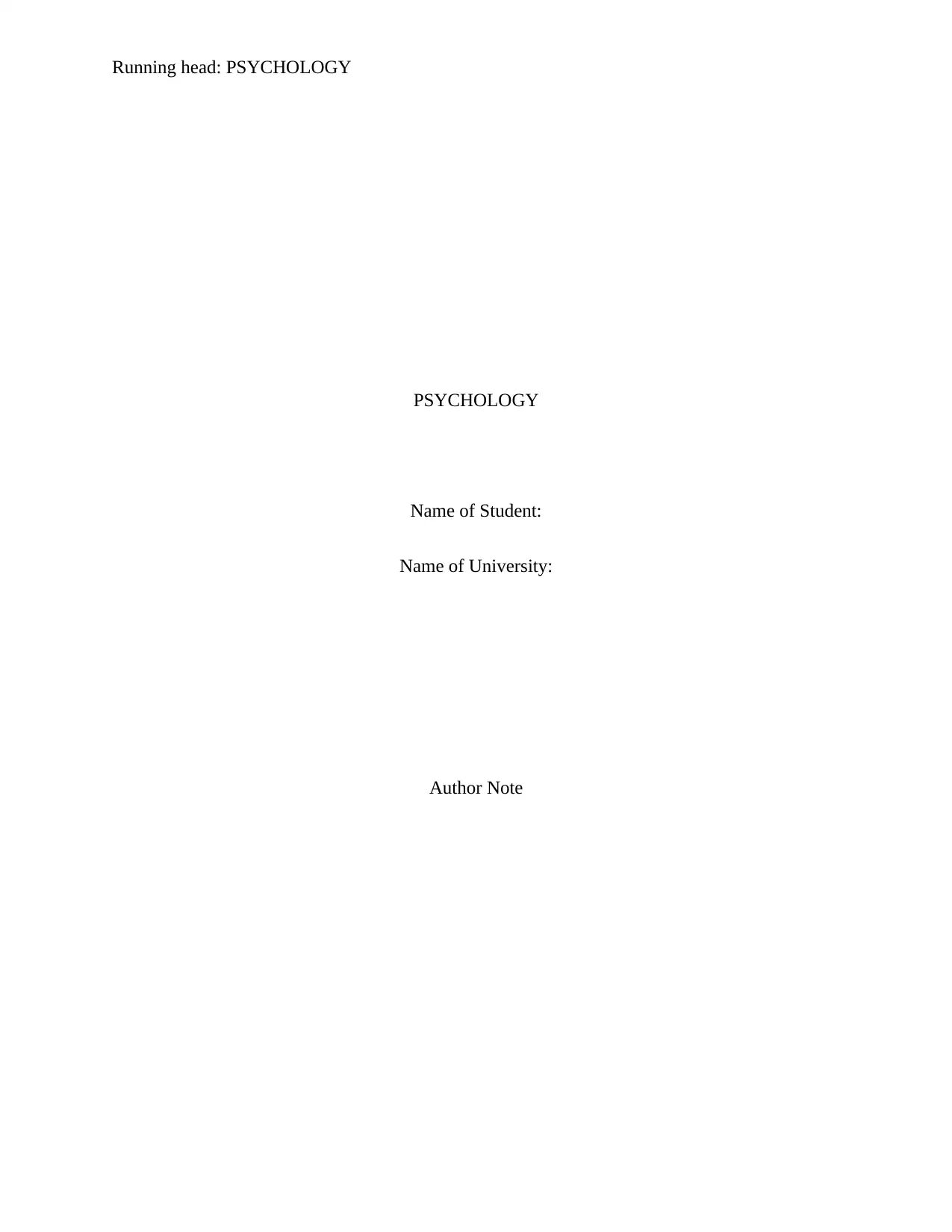
Running head: PSYCHOLOGY
PSYCHOLOGY
Name of Student:
Name of University:
Author Note
PSYCHOLOGY
Name of Student:
Name of University:
Author Note
Secure Best Marks with AI Grader
Need help grading? Try our AI Grader for instant feedback on your assignments.
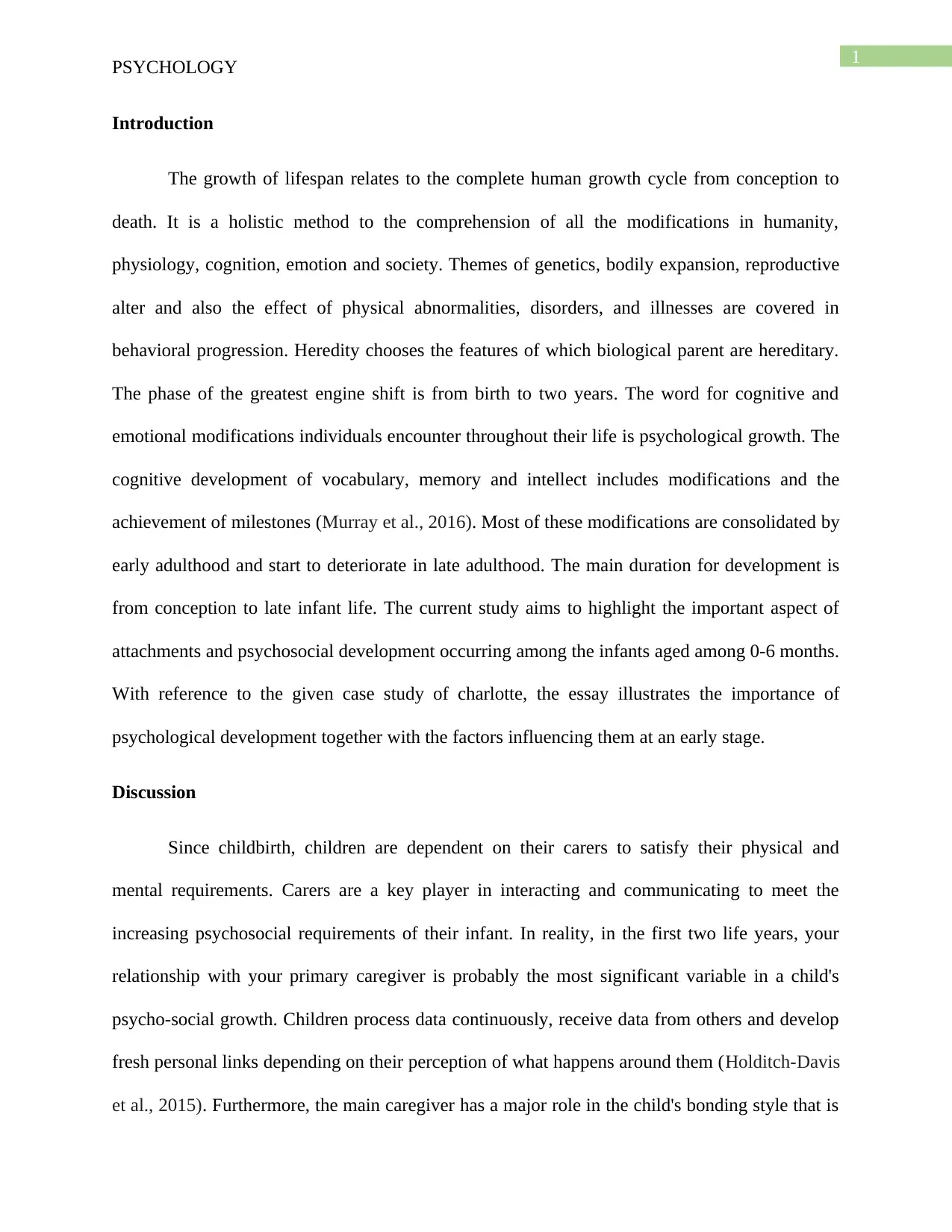
1
PSYCHOLOGY
Introduction
The growth of lifespan relates to the complete human growth cycle from conception to
death. It is a holistic method to the comprehension of all the modifications in humanity,
physiology, cognition, emotion and society. Themes of genetics, bodily expansion, reproductive
alter and also the effect of physical abnormalities, disorders, and illnesses are covered in
behavioral progression. Heredity chooses the features of which biological parent are hereditary.
The phase of the greatest engine shift is from birth to two years. The word for cognitive and
emotional modifications individuals encounter throughout their life is psychological growth. The
cognitive development of vocabulary, memory and intellect includes modifications and the
achievement of milestones (Murray et al., 2016). Most of these modifications are consolidated by
early adulthood and start to deteriorate in late adulthood. The main duration for development is
from conception to late infant life. The current study aims to highlight the important aspect of
attachments and psychosocial development occurring among the infants aged among 0-6 months.
With reference to the given case study of charlotte, the essay illustrates the importance of
psychological development together with the factors influencing them at an early stage.
Discussion
Since childbirth, children are dependent on their carers to satisfy their physical and
mental requirements. Carers are a key player in interacting and communicating to meet the
increasing psychosocial requirements of their infant. In reality, in the first two life years, your
relationship with your primary caregiver is probably the most significant variable in a child's
psycho-social growth. Children process data continuously, receive data from others and develop
fresh personal links depending on their perception of what happens around them (Holditch-Davis
et al., 2015). Furthermore, the main caregiver has a major role in the child's bonding style that is
PSYCHOLOGY
Introduction
The growth of lifespan relates to the complete human growth cycle from conception to
death. It is a holistic method to the comprehension of all the modifications in humanity,
physiology, cognition, emotion and society. Themes of genetics, bodily expansion, reproductive
alter and also the effect of physical abnormalities, disorders, and illnesses are covered in
behavioral progression. Heredity chooses the features of which biological parent are hereditary.
The phase of the greatest engine shift is from birth to two years. The word for cognitive and
emotional modifications individuals encounter throughout their life is psychological growth. The
cognitive development of vocabulary, memory and intellect includes modifications and the
achievement of milestones (Murray et al., 2016). Most of these modifications are consolidated by
early adulthood and start to deteriorate in late adulthood. The main duration for development is
from conception to late infant life. The current study aims to highlight the important aspect of
attachments and psychosocial development occurring among the infants aged among 0-6 months.
With reference to the given case study of charlotte, the essay illustrates the importance of
psychological development together with the factors influencing them at an early stage.
Discussion
Since childbirth, children are dependent on their carers to satisfy their physical and
mental requirements. Carers are a key player in interacting and communicating to meet the
increasing psychosocial requirements of their infant. In reality, in the first two life years, your
relationship with your primary caregiver is probably the most significant variable in a child's
psycho-social growth. Children process data continuously, receive data from others and develop
fresh personal links depending on their perception of what happens around them (Holditch-Davis
et al., 2015). Furthermore, the main caregiver has a major role in the child's bonding style that is
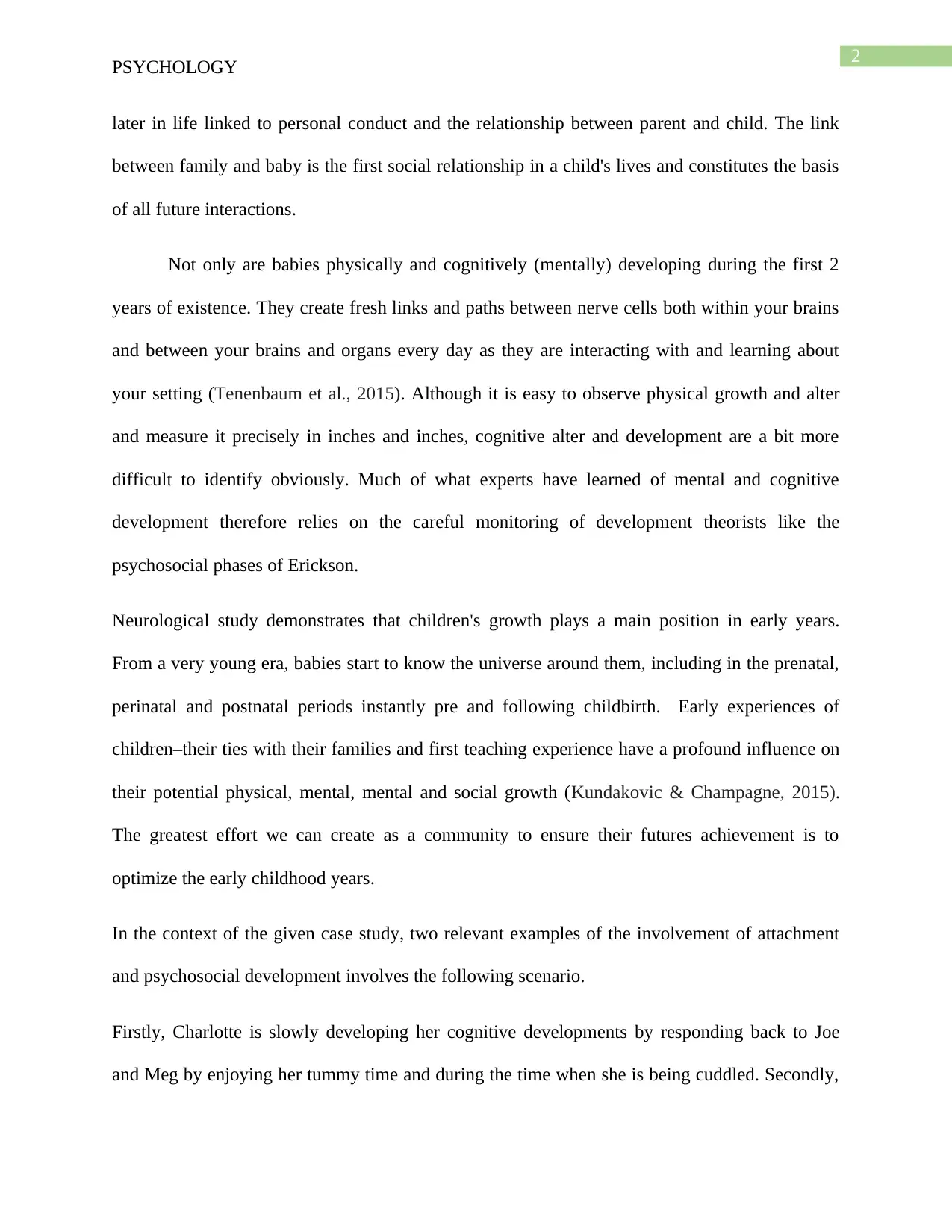
2
PSYCHOLOGY
later in life linked to personal conduct and the relationship between parent and child. The link
between family and baby is the first social relationship in a child's lives and constitutes the basis
of all future interactions.
Not only are babies physically and cognitively (mentally) developing during the first 2
years of existence. They create fresh links and paths between nerve cells both within your brains
and between your brains and organs every day as they are interacting with and learning about
your setting (Tenenbaum et al., 2015). Although it is easy to observe physical growth and alter
and measure it precisely in inches and inches, cognitive alter and development are a bit more
difficult to identify obviously. Much of what experts have learned of mental and cognitive
development therefore relies on the careful monitoring of development theorists like the
psychosocial phases of Erickson.
Neurological study demonstrates that children's growth plays a main position in early years.
From a very young era, babies start to know the universe around them, including in the prenatal,
perinatal and postnatal periods instantly pre and following childbirth. Early experiences of
children–their ties with their families and first teaching experience have a profound influence on
their potential physical, mental, mental and social growth (Kundakovic & Champagne, 2015).
The greatest effort we can create as a community to ensure their futures achievement is to
optimize the early childhood years.
In the context of the given case study, two relevant examples of the involvement of attachment
and psychosocial development involves the following scenario.
Firstly, Charlotte is slowly developing her cognitive developments by responding back to Joe
and Meg by enjoying her tummy time and during the time when she is being cuddled. Secondly,
PSYCHOLOGY
later in life linked to personal conduct and the relationship between parent and child. The link
between family and baby is the first social relationship in a child's lives and constitutes the basis
of all future interactions.
Not only are babies physically and cognitively (mentally) developing during the first 2
years of existence. They create fresh links and paths between nerve cells both within your brains
and between your brains and organs every day as they are interacting with and learning about
your setting (Tenenbaum et al., 2015). Although it is easy to observe physical growth and alter
and measure it precisely in inches and inches, cognitive alter and development are a bit more
difficult to identify obviously. Much of what experts have learned of mental and cognitive
development therefore relies on the careful monitoring of development theorists like the
psychosocial phases of Erickson.
Neurological study demonstrates that children's growth plays a main position in early years.
From a very young era, babies start to know the universe around them, including in the prenatal,
perinatal and postnatal periods instantly pre and following childbirth. Early experiences of
children–their ties with their families and first teaching experience have a profound influence on
their potential physical, mental, mental and social growth (Kundakovic & Champagne, 2015).
The greatest effort we can create as a community to ensure their futures achievement is to
optimize the early childhood years.
In the context of the given case study, two relevant examples of the involvement of attachment
and psychosocial development involves the following scenario.
Firstly, Charlotte is slowly developing her cognitive developments by responding back to Joe
and Meg by enjoying her tummy time and during the time when she is being cuddled. Secondly,
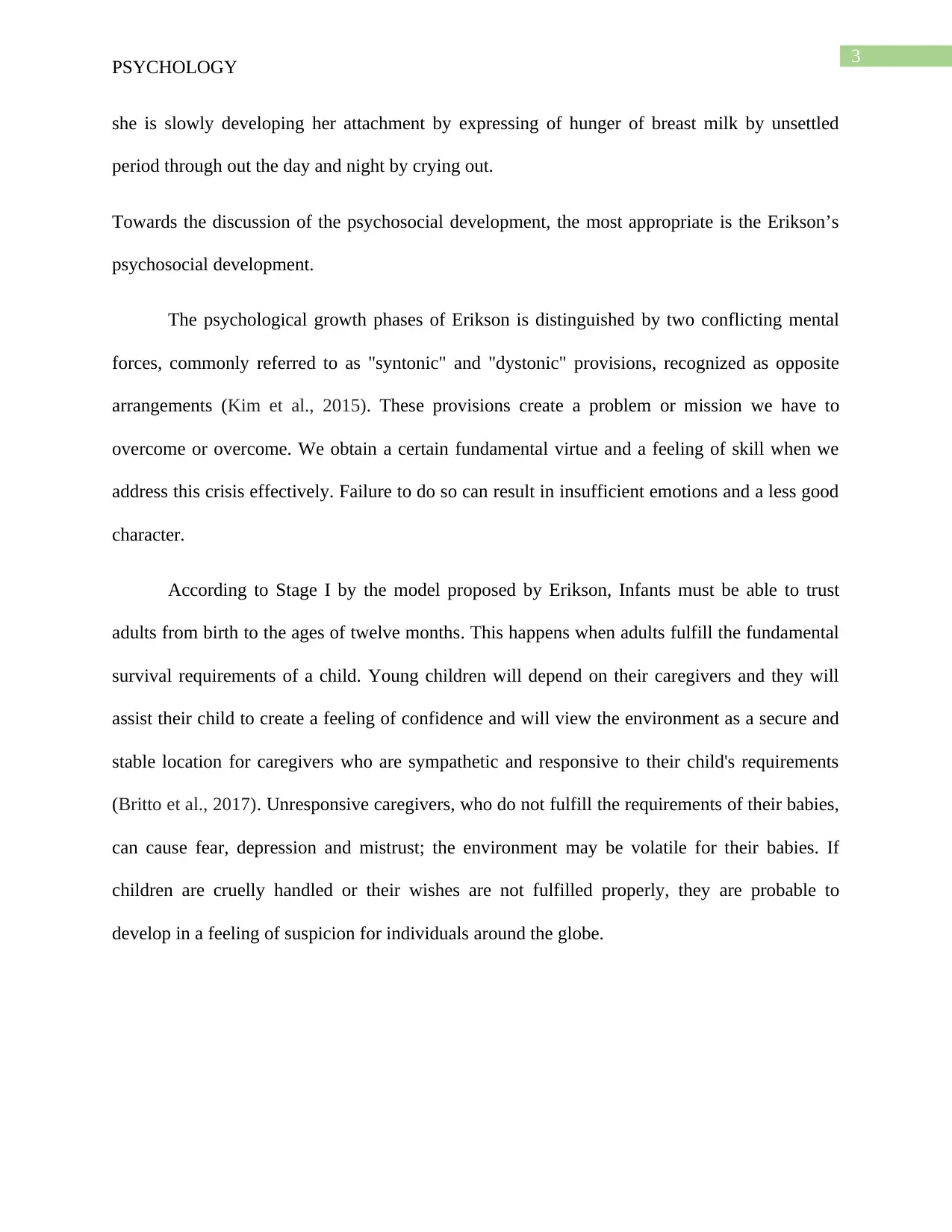
3
PSYCHOLOGY
she is slowly developing her attachment by expressing of hunger of breast milk by unsettled
period through out the day and night by crying out.
Towards the discussion of the psychosocial development, the most appropriate is the Erikson’s
psychosocial development.
The psychological growth phases of Erikson is distinguished by two conflicting mental
forces, commonly referred to as "syntonic" and "dystonic" provisions, recognized as opposite
arrangements (Kim et al., 2015). These provisions create a problem or mission we have to
overcome or overcome. We obtain a certain fundamental virtue and a feeling of skill when we
address this crisis effectively. Failure to do so can result in insufficient emotions and a less good
character.
According to Stage I by the model proposed by Erikson, Infants must be able to trust
adults from birth to the ages of twelve months. This happens when adults fulfill the fundamental
survival requirements of a child. Young children will depend on their caregivers and they will
assist their child to create a feeling of confidence and will view the environment as a secure and
stable location for caregivers who are sympathetic and responsive to their child's requirements
(Britto et al., 2017). Unresponsive caregivers, who do not fulfill the requirements of their babies,
can cause fear, depression and mistrust; the environment may be volatile for their babies. If
children are cruelly handled or their wishes are not fulfilled properly, they are probable to
develop in a feeling of suspicion for individuals around the globe.
PSYCHOLOGY
she is slowly developing her attachment by expressing of hunger of breast milk by unsettled
period through out the day and night by crying out.
Towards the discussion of the psychosocial development, the most appropriate is the Erikson’s
psychosocial development.
The psychological growth phases of Erikson is distinguished by two conflicting mental
forces, commonly referred to as "syntonic" and "dystonic" provisions, recognized as opposite
arrangements (Kim et al., 2015). These provisions create a problem or mission we have to
overcome or overcome. We obtain a certain fundamental virtue and a feeling of skill when we
address this crisis effectively. Failure to do so can result in insufficient emotions and a less good
character.
According to Stage I by the model proposed by Erikson, Infants must be able to trust
adults from birth to the ages of twelve months. This happens when adults fulfill the fundamental
survival requirements of a child. Young children will depend on their caregivers and they will
assist their child to create a feeling of confidence and will view the environment as a secure and
stable location for caregivers who are sympathetic and responsive to their child's requirements
(Britto et al., 2017). Unresponsive caregivers, who do not fulfill the requirements of their babies,
can cause fear, depression and mistrust; the environment may be volatile for their babies. If
children are cruelly handled or their wishes are not fulfilled properly, they are probable to
develop in a feeling of suspicion for individuals around the globe.
Secure Best Marks with AI Grader
Need help grading? Try our AI Grader for instant feedback on your assignments.
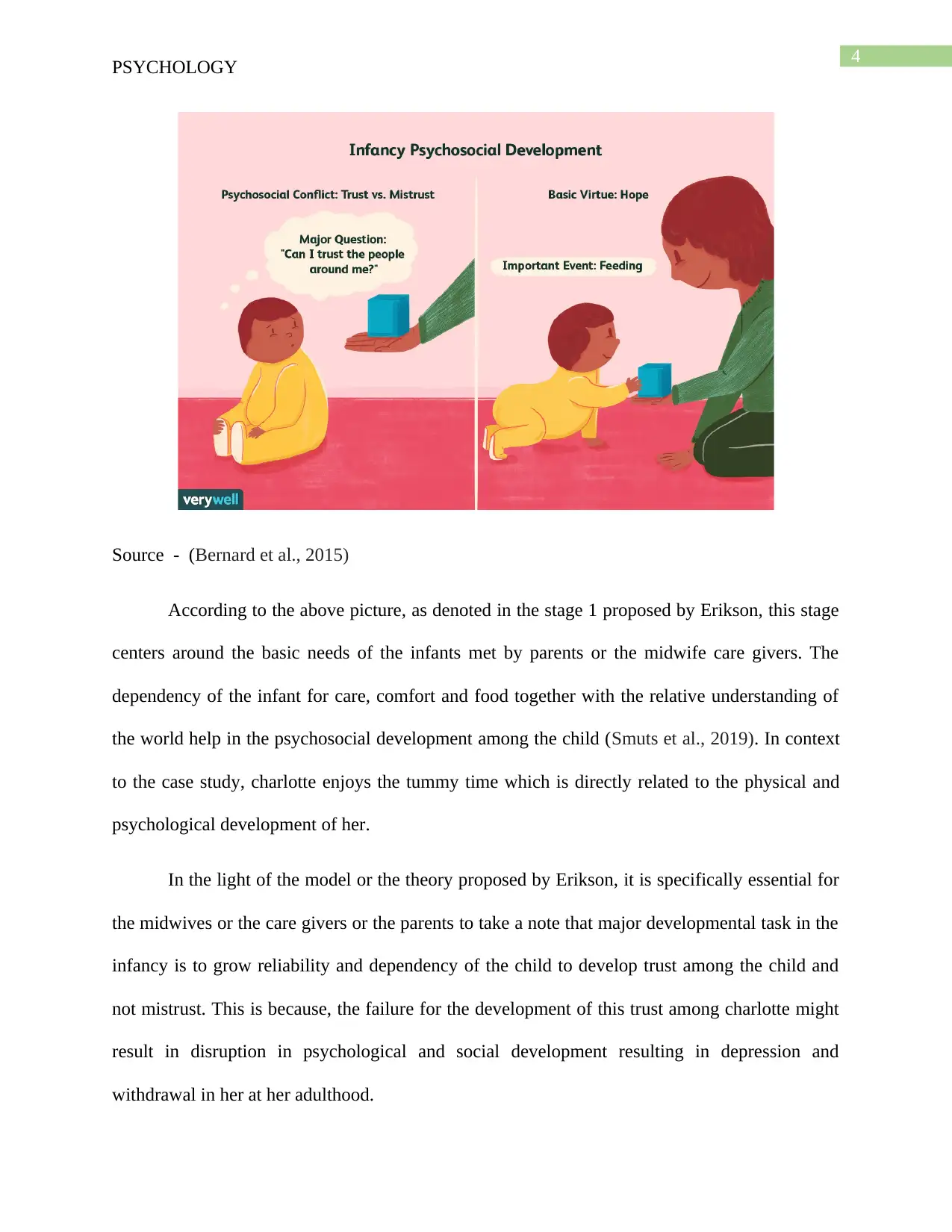
4
PSYCHOLOGY
Source - (Bernard et al., 2015)
According to the above picture, as denoted in the stage 1 proposed by Erikson, this stage
centers around the basic needs of the infants met by parents or the midwife care givers. The
dependency of the infant for care, comfort and food together with the relative understanding of
the world help in the psychosocial development among the child (Smuts et al., 2019). In context
to the case study, charlotte enjoys the tummy time which is directly related to the physical and
psychological development of her.
In the light of the model or the theory proposed by Erikson, it is specifically essential for
the midwives or the care givers or the parents to take a note that major developmental task in the
infancy is to grow reliability and dependency of the child to develop trust among the child and
not mistrust. This is because, the failure for the development of this trust among charlotte might
result in disruption in psychological and social development resulting in depression and
withdrawal in her at her adulthood.
PSYCHOLOGY
Source - (Bernard et al., 2015)
According to the above picture, as denoted in the stage 1 proposed by Erikson, this stage
centers around the basic needs of the infants met by parents or the midwife care givers. The
dependency of the infant for care, comfort and food together with the relative understanding of
the world help in the psychosocial development among the child (Smuts et al., 2019). In context
to the case study, charlotte enjoys the tummy time which is directly related to the physical and
psychological development of her.
In the light of the model or the theory proposed by Erikson, it is specifically essential for
the midwives or the care givers or the parents to take a note that major developmental task in the
infancy is to grow reliability and dependency of the child to develop trust among the child and
not mistrust. This is because, the failure for the development of this trust among charlotte might
result in disruption in psychological and social development resulting in depression and
withdrawal in her at her adulthood.
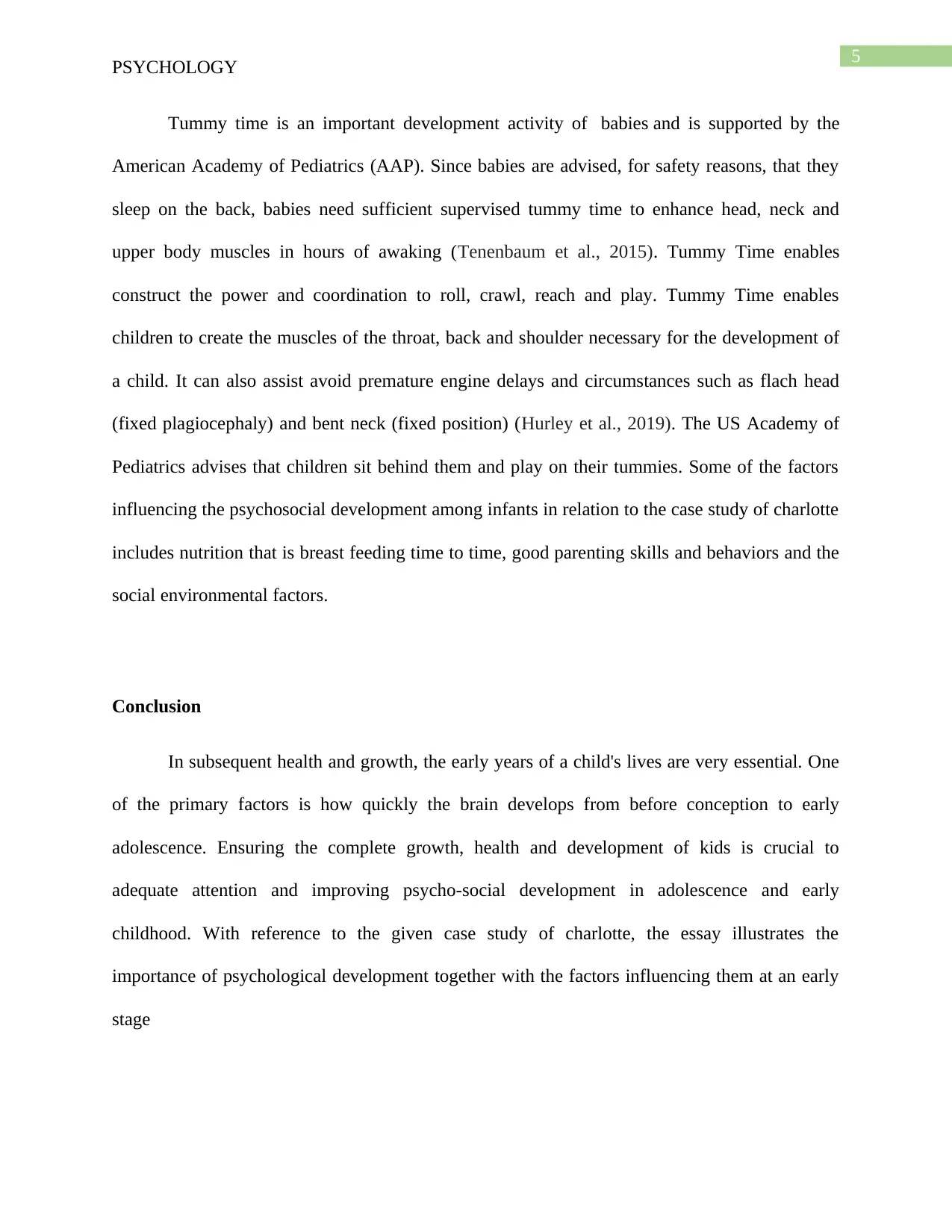
5
PSYCHOLOGY
Tummy time is an important development activity of babies and is supported by the
American Academy of Pediatrics (AAP). Since babies are advised, for safety reasons, that they
sleep on the back, babies need sufficient supervised tummy time to enhance head, neck and
upper body muscles in hours of awaking (Tenenbaum et al., 2015). Tummy Time enables
construct the power and coordination to roll, crawl, reach and play. Tummy Time enables
children to create the muscles of the throat, back and shoulder necessary for the development of
a child. It can also assist avoid premature engine delays and circumstances such as flach head
(fixed plagiocephaly) and bent neck (fixed position) (Hurley et al., 2019). The US Academy of
Pediatrics advises that children sit behind them and play on their tummies. Some of the factors
influencing the psychosocial development among infants in relation to the case study of charlotte
includes nutrition that is breast feeding time to time, good parenting skills and behaviors and the
social environmental factors.
Conclusion
In subsequent health and growth, the early years of a child's lives are very essential. One
of the primary factors is how quickly the brain develops from before conception to early
adolescence. Ensuring the complete growth, health and development of kids is crucial to
adequate attention and improving psycho-social development in adolescence and early
childhood. With reference to the given case study of charlotte, the essay illustrates the
importance of psychological development together with the factors influencing them at an early
stage
PSYCHOLOGY
Tummy time is an important development activity of babies and is supported by the
American Academy of Pediatrics (AAP). Since babies are advised, for safety reasons, that they
sleep on the back, babies need sufficient supervised tummy time to enhance head, neck and
upper body muscles in hours of awaking (Tenenbaum et al., 2015). Tummy Time enables
construct the power and coordination to roll, crawl, reach and play. Tummy Time enables
children to create the muscles of the throat, back and shoulder necessary for the development of
a child. It can also assist avoid premature engine delays and circumstances such as flach head
(fixed plagiocephaly) and bent neck (fixed position) (Hurley et al., 2019). The US Academy of
Pediatrics advises that children sit behind them and play on their tummies. Some of the factors
influencing the psychosocial development among infants in relation to the case study of charlotte
includes nutrition that is breast feeding time to time, good parenting skills and behaviors and the
social environmental factors.
Conclusion
In subsequent health and growth, the early years of a child's lives are very essential. One
of the primary factors is how quickly the brain develops from before conception to early
adolescence. Ensuring the complete growth, health and development of kids is crucial to
adequate attention and improving psycho-social development in adolescence and early
childhood. With reference to the given case study of charlotte, the essay illustrates the
importance of psychological development together with the factors influencing them at an early
stage
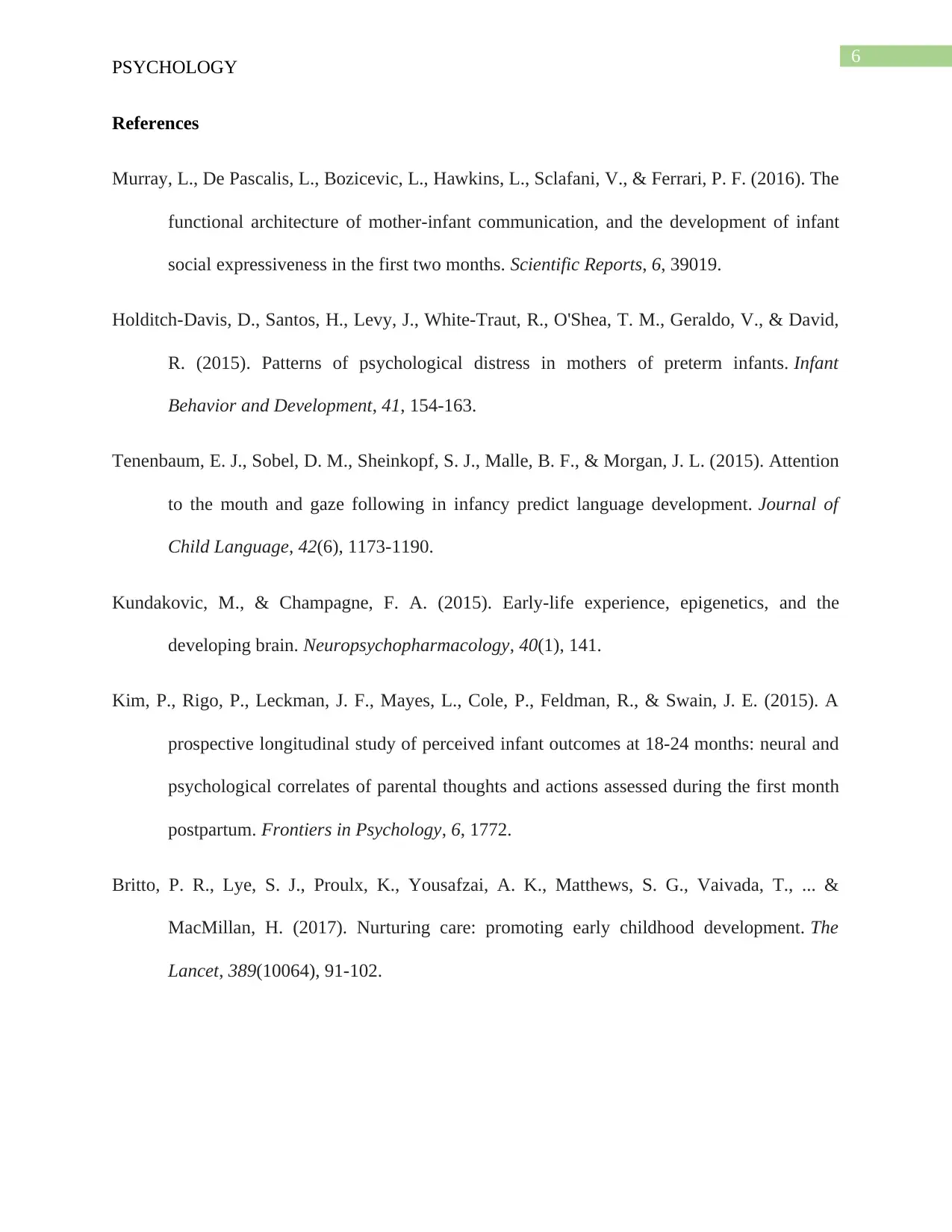
6
PSYCHOLOGY
References
Murray, L., De Pascalis, L., Bozicevic, L., Hawkins, L., Sclafani, V., & Ferrari, P. F. (2016). The
functional architecture of mother-infant communication, and the development of infant
social expressiveness in the first two months. Scientific Reports, 6, 39019.
Holditch-Davis, D., Santos, H., Levy, J., White-Traut, R., O'Shea, T. M., Geraldo, V., & David,
R. (2015). Patterns of psychological distress in mothers of preterm infants. Infant
Behavior and Development, 41, 154-163.
Tenenbaum, E. J., Sobel, D. M., Sheinkopf, S. J., Malle, B. F., & Morgan, J. L. (2015). Attention
to the mouth and gaze following in infancy predict language development. Journal of
Child Language, 42(6), 1173-1190.
Kundakovic, M., & Champagne, F. A. (2015). Early-life experience, epigenetics, and the
developing brain. Neuropsychopharmacology, 40(1), 141.
Kim, P., Rigo, P., Leckman, J. F., Mayes, L., Cole, P., Feldman, R., & Swain, J. E. (2015). A
prospective longitudinal study of perceived infant outcomes at 18-24 months: neural and
psychological correlates of parental thoughts and actions assessed during the first month
postpartum. Frontiers in Psychology, 6, 1772.
Britto, P. R., Lye, S. J., Proulx, K., Yousafzai, A. K., Matthews, S. G., Vaivada, T., ... &
MacMillan, H. (2017). Nurturing care: promoting early childhood development. The
Lancet, 389(10064), 91-102.
PSYCHOLOGY
References
Murray, L., De Pascalis, L., Bozicevic, L., Hawkins, L., Sclafani, V., & Ferrari, P. F. (2016). The
functional architecture of mother-infant communication, and the development of infant
social expressiveness in the first two months. Scientific Reports, 6, 39019.
Holditch-Davis, D., Santos, H., Levy, J., White-Traut, R., O'Shea, T. M., Geraldo, V., & David,
R. (2015). Patterns of psychological distress in mothers of preterm infants. Infant
Behavior and Development, 41, 154-163.
Tenenbaum, E. J., Sobel, D. M., Sheinkopf, S. J., Malle, B. F., & Morgan, J. L. (2015). Attention
to the mouth and gaze following in infancy predict language development. Journal of
Child Language, 42(6), 1173-1190.
Kundakovic, M., & Champagne, F. A. (2015). Early-life experience, epigenetics, and the
developing brain. Neuropsychopharmacology, 40(1), 141.
Kim, P., Rigo, P., Leckman, J. F., Mayes, L., Cole, P., Feldman, R., & Swain, J. E. (2015). A
prospective longitudinal study of perceived infant outcomes at 18-24 months: neural and
psychological correlates of parental thoughts and actions assessed during the first month
postpartum. Frontiers in Psychology, 6, 1772.
Britto, P. R., Lye, S. J., Proulx, K., Yousafzai, A. K., Matthews, S. G., Vaivada, T., ... &
MacMillan, H. (2017). Nurturing care: promoting early childhood development. The
Lancet, 389(10064), 91-102.
Paraphrase This Document
Need a fresh take? Get an instant paraphrase of this document with our AI Paraphraser
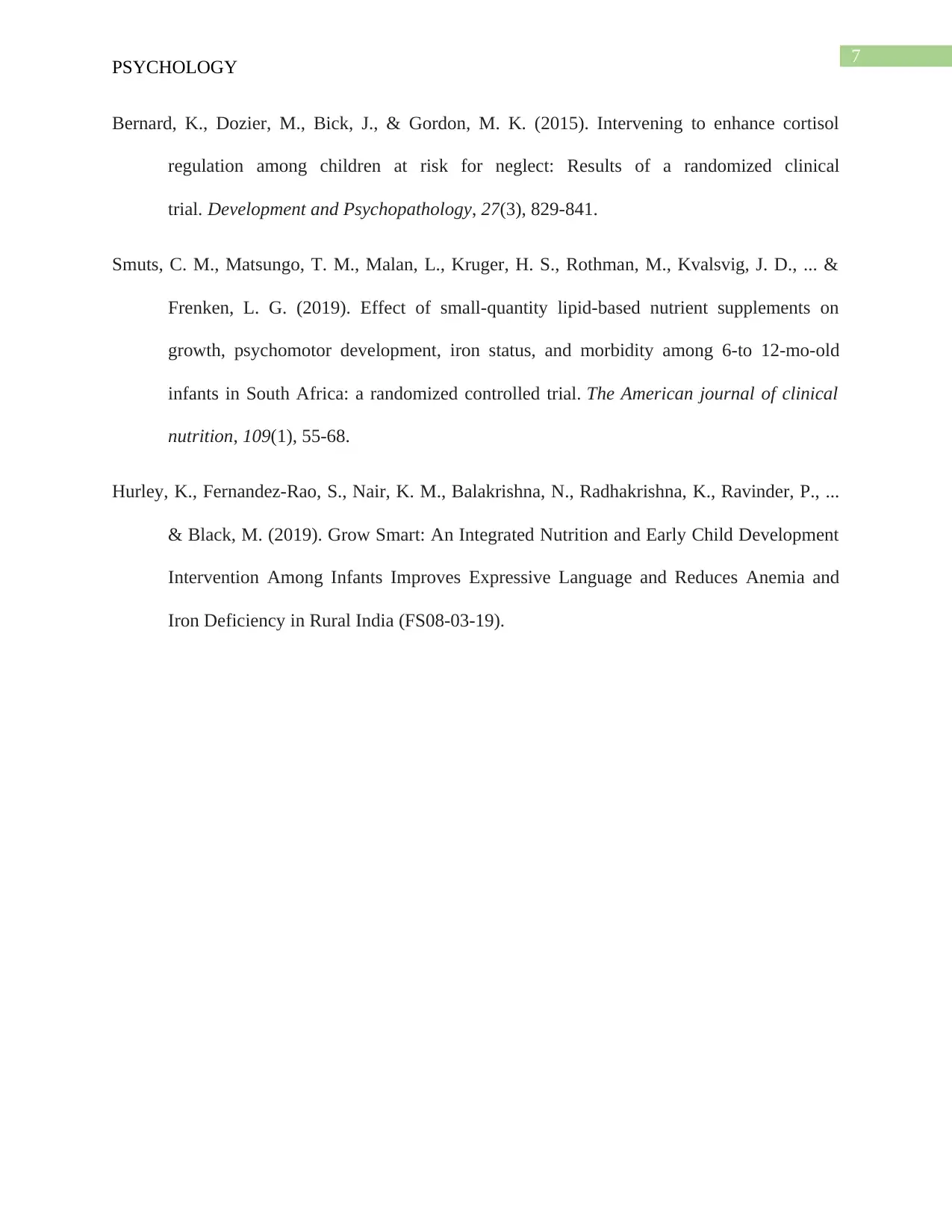
7
PSYCHOLOGY
Bernard, K., Dozier, M., Bick, J., & Gordon, M. K. (2015). Intervening to enhance cortisol
regulation among children at risk for neglect: Results of a randomized clinical
trial. Development and Psychopathology, 27(3), 829-841.
Smuts, C. M., Matsungo, T. M., Malan, L., Kruger, H. S., Rothman, M., Kvalsvig, J. D., ... &
Frenken, L. G. (2019). Effect of small-quantity lipid-based nutrient supplements on
growth, psychomotor development, iron status, and morbidity among 6-to 12-mo-old
infants in South Africa: a randomized controlled trial. The American journal of clinical
nutrition, 109(1), 55-68.
Hurley, K., Fernandez-Rao, S., Nair, K. M., Balakrishna, N., Radhakrishna, K., Ravinder, P., ...
& Black, M. (2019). Grow Smart: An Integrated Nutrition and Early Child Development
Intervention Among Infants Improves Expressive Language and Reduces Anemia and
Iron Deficiency in Rural India (FS08-03-19).
PSYCHOLOGY
Bernard, K., Dozier, M., Bick, J., & Gordon, M. K. (2015). Intervening to enhance cortisol
regulation among children at risk for neglect: Results of a randomized clinical
trial. Development and Psychopathology, 27(3), 829-841.
Smuts, C. M., Matsungo, T. M., Malan, L., Kruger, H. S., Rothman, M., Kvalsvig, J. D., ... &
Frenken, L. G. (2019). Effect of small-quantity lipid-based nutrient supplements on
growth, psychomotor development, iron status, and morbidity among 6-to 12-mo-old
infants in South Africa: a randomized controlled trial. The American journal of clinical
nutrition, 109(1), 55-68.
Hurley, K., Fernandez-Rao, S., Nair, K. M., Balakrishna, N., Radhakrishna, K., Ravinder, P., ...
& Black, M. (2019). Grow Smart: An Integrated Nutrition and Early Child Development
Intervention Among Infants Improves Expressive Language and Reduces Anemia and
Iron Deficiency in Rural India (FS08-03-19).
1 out of 8
Related Documents
Your All-in-One AI-Powered Toolkit for Academic Success.
+13062052269
info@desklib.com
Available 24*7 on WhatsApp / Email
![[object Object]](/_next/static/media/star-bottom.7253800d.svg)
Unlock your academic potential
© 2024 | Zucol Services PVT LTD | All rights reserved.





